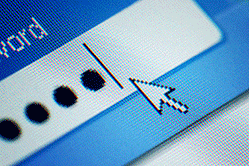Five ways to create strong passwords that are hard to crack
Five ways to create strong passwords that are hard to crack
 Hardly a week goes by without one company or another being hacked and user passwords being made public on the internet. Do we have any hope of keeping our passwords safe?
Hardly a week goes by without one company or another being hacked and user passwords being made public on the internet. Do we have any hope of keeping our passwords safe?
Actually we do have some hope, but we all have to play our part and choose strong passwords.
Hopefully, the websites we have online accounts with are doing their utmost to protect our personal information, and in particular our passwords. But even if they are, that’s not the end of the story as simple passwords can be cracked quite easily by hackers.
We need to do our bit by making sure we have strong passwords that are hard to crack. Here are five ways.
1. Think of a word and a number
Word: Olympics
Number: 1066
All you need to do is mix these up a bit to come up with a good password. For example:
10Olympics66
Olym10pics66
1Ol0ym6pi6cs
Top tip: make sure you mix it up. The password Olympics1066 is not as strong as the others.
2. Think of a lyric, name and a number
Lyric: She was more like a beauty queen from a movie scene
Name: Michael Jackson
Number: 1983 (Song released in this year)
Choose the first letter from the phrase and mix the initials and number in. For example:
SwmlabqfamsMJ1983
MJSwmlabqfams3891
M19Swmlabqfams83J
Top tip: once you decide how you want to mix it up, stick with it. If the mixing it up part could confuse you then you could write down a memory jogger – read on to find out how.
3. It doesn’t have to be too long
Phrase: Just like that
Name: Tommy Cooper
Number: 1921 (his birth year)
Password:
JltTC1921
You get the idea!
4. Write down a memory jogger
We all need help remembering things so why not write down something to help jog your memory? It is very unlikely that someone will be able to decipher a decent memory jogger, because you can write things down in a way that makes perfect sense to you but is useless to anyone else.
Lets take the Tommy Cooper example. You could have ‘Tommy’ written down in your address book, followed by a memory jogger, like this:
Tommy: Idp-pdI
In this case the memory jogger stands for initial-date-phrase-date-initial
Using this would give a password of:
T19jlt21C
5. And finally…
Remember, that really need to change your passwords every so often, because you can never be quite certain if your password is in the wrong hands.
The biggest problem most of us face is that we have so many online accounts that we forget what they are. Give yourself a fighting chance and keep a list somewhere. As you join new shopping sites, social sites and other sites, add them to the list. If you want to change a password, you will at least know where to look!




Comments
Add a comment